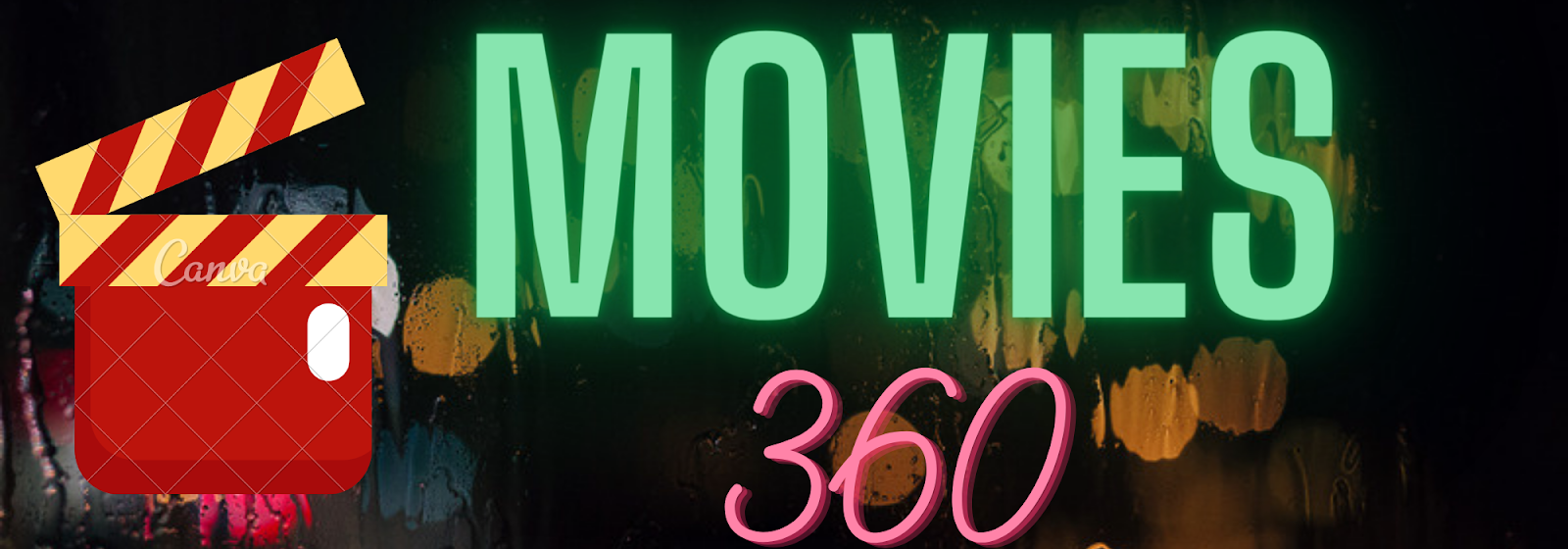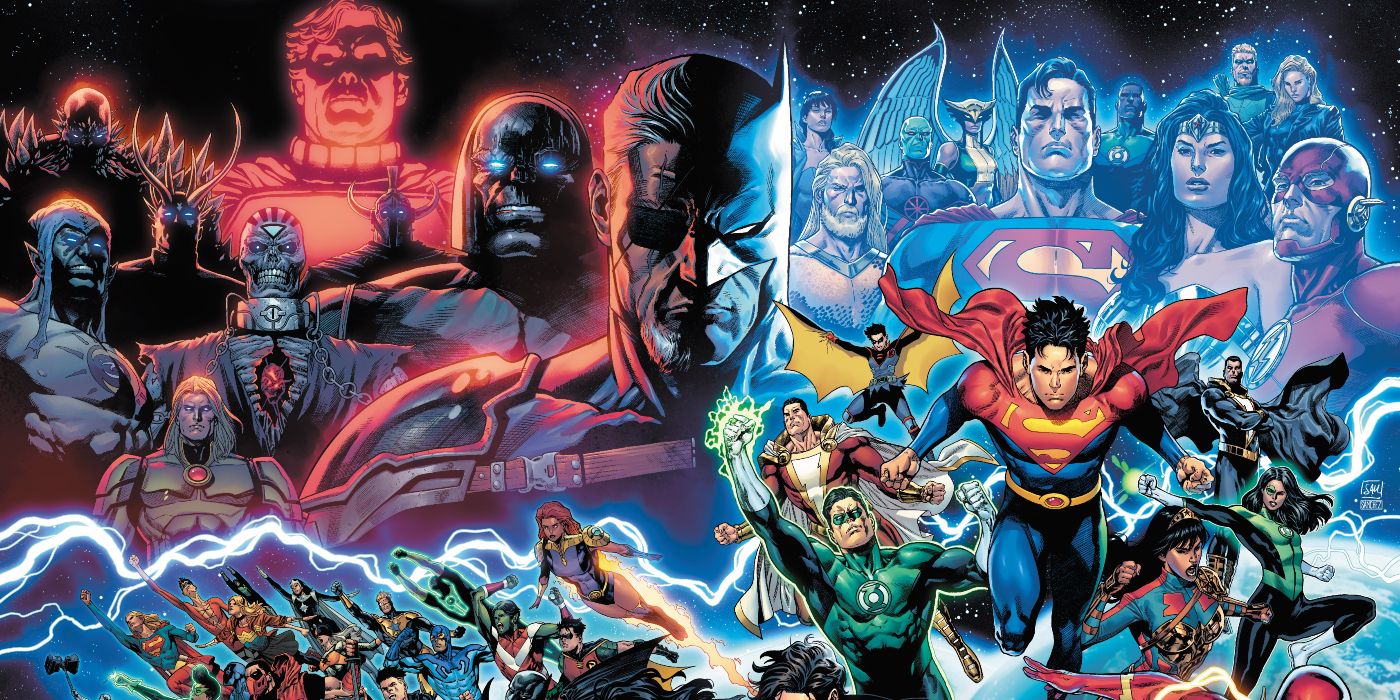
The biggest DC Comics event of the year is here, with Dark Crisis on Infinite Earths, revealed to be a direct sequel to the original Crisis on Infinite Earths crossover. With the Justice League dead and the remaining heroes on Earth and beyond scrambling to make sense of a world without its most iconic superhero team, Dark Crisis as an event is concerned with legacy.
At San Diego Comic-Con, DC Comics revealed that the full name of their Dark Crisis event was Dark Crisis on Infinite Earths, a fitting title given that many of the original Crisis' players, like Pariah and Doctor Light, are back in play. Another notable piece of the event is that it will reintroduce the Infinite Earths into the DC Universe, kicking off a new era of infinite possibility. We sat down with writer Joshua Williamson and artist Daniel Sampere at SDCC to discuss what went into the reveal, as well as what fans can expect from the epic story as it continues this year.
Screen Rant: Why make Dark Crisis on Infinite Earths a direct sequel to the original, and why now, in this specific moment in the DCU?
Joshua Williamson: We were keeping it secret at first, because I didn't want to ruin it too quickly. You know, I didn't want to give away that piece too fast. I wanted to kind of get a little bit more into it. And the timing is right, obviously, we're at San Diego Comic-Con. So that's a big piece too. But we didn't want to ruin the surprise too quickly. We're doing a sequel. I mean, that wasn't my original goal. In the very beginning, my original goal was very much tell a story about legacy in the DCU. But the more and more we started working on it, especially once Pariah became very heavily involved, and Pariah is so involved in the original, that I felt like, "Oh yeah, this is definitely leaning into that direction of it being a sequel," and playing with a lot of elements there. And then with the Infinite Earths, that was part of the plan from the beginning. Because to me, and I said this on the [DC's Dark Crisis] panel, to me, the best version of the DCU is the one that's always growing. And I feel like there's been a lot of times where people have tried to put limitations on the DCU. And so I was like, "Alright, well, instead of dealing with that, let's let's go the opposite. Let's grow, which is really what I think DC should be doing." So that's why it made sense to bring back the Earths because it should be infinite possibility.
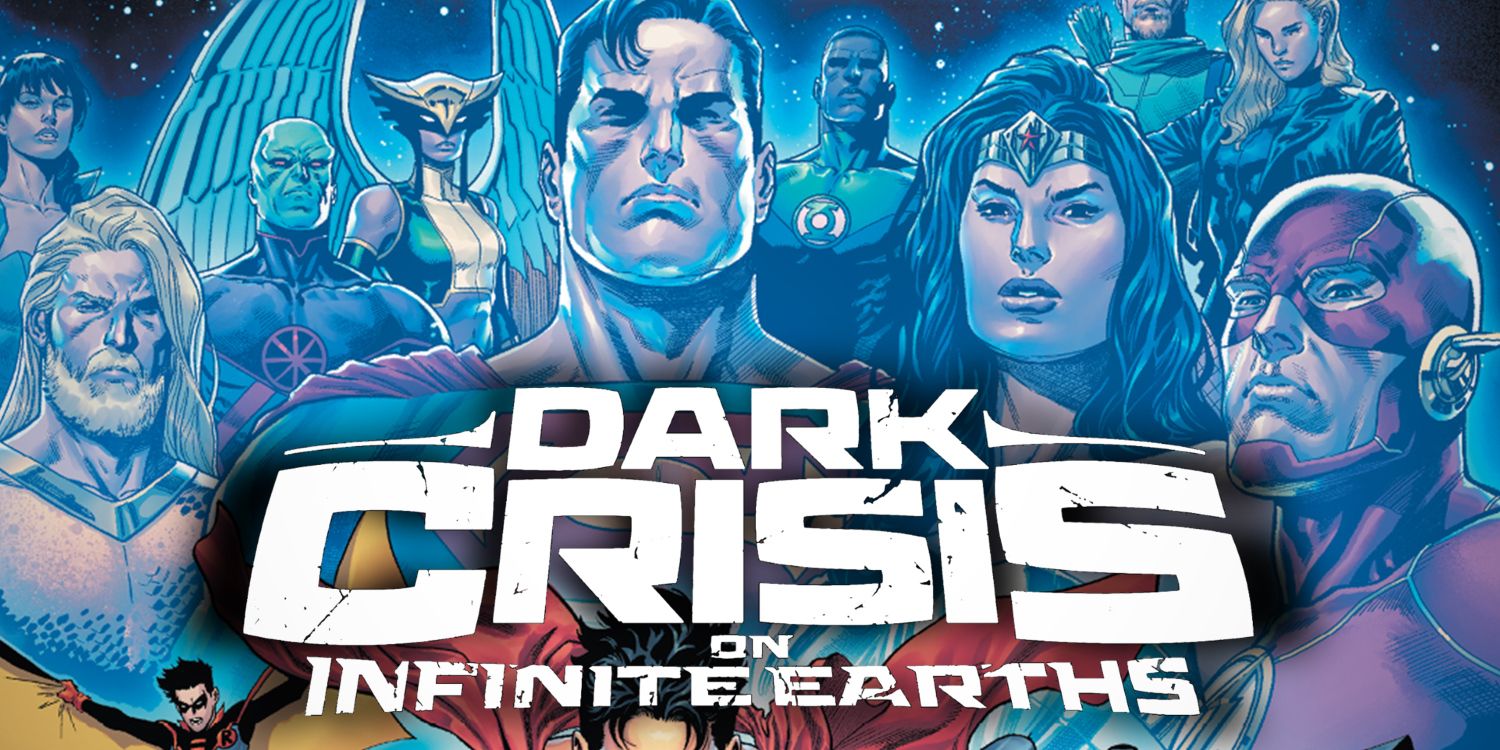
To dig further into that idea of both legacy and growing, I think those are such unique themes. How with legacy, do you engage in it and reference the past, while also growing forwards? How do we grow forwards if we're looking back a little bit with legacy?
Joshua Williamson: I mean, I think you do have to look back a little bit, I think you have to kind of acknowledge it. When I started reading DC and becoming very much a DC fan back in the late 80s, early 90s, there were all these new characters being introduced – Tim [Drake] and Conner [Kent] and Bart [Allen] and Cassie [Sandsmark]. All these new things were being introduced all the time. And it was them like hand in hand with what had come before. And I think that's how you look forward is you have to be able to let it grow. But you also have to give entry points. And I always remembered that that's how it was for me. The best way sometimes to show what is great about that stuff from the past is through a new lens. And so that's what Dark Crisis is, we've had a lot of new characters, not just in the last five years, we've had new characters going back to the original Crisis On Infinite Earths, and a lot of new characters, a lot of legacy characters. And there was a moment, where I feel like a lot of that stuff kind of got shoved to the side. It can be hard, sometimes to leave that stuff behind, but I don't think you should bury it. I think it's always a mistake. And I think sometimes people think the best way to move forward is to destroy and it's like, "No, you build on those things." And that's how I think you are able to move forward and be about legacy, but you need to honor the stuff that came before. It's the foundation.
Daniel Sampere: I feel the same and I also think that all of this DC legacy and past has been been built already. Also DC has a legacy on the visuals not also on the characters and the story. DC has a spirit, a specific visuals that we are familiar that are built from masters before, you know, like, George Pérez, and all the great artists that helped through the years to build that not also legacy on the stories, but on the visuals. So I was thinking of it, and I tried to to add all of what Josh was saying right now, on the visual aspect of the comic book. So I tried a lot to look at the past and pick some things, you know, from the visuals that DC already has, and mix it by some new stuff that I will bring to the table. When someone reads Dark Crisis it feels like something familiar, but at the same time it's new and even better new visuals, but with that feeling that you know what you're reading, if you're a DC fan. That was the goal.
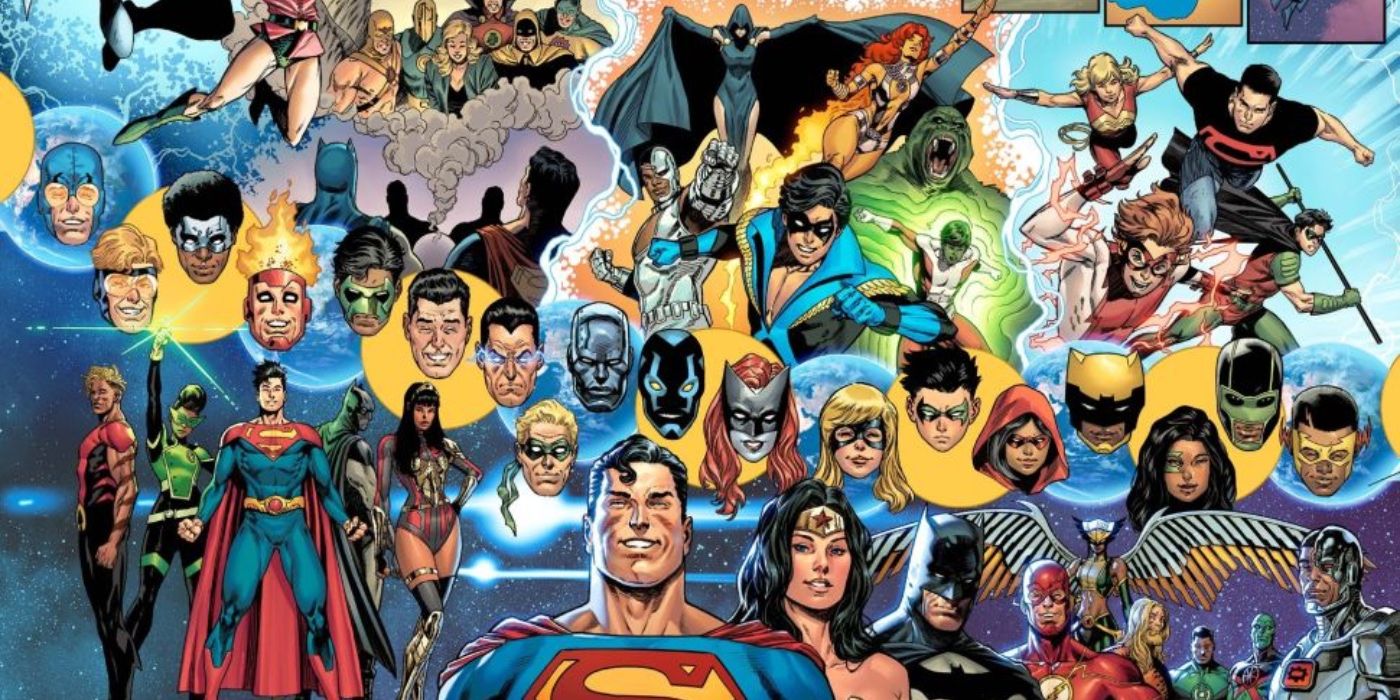
Particularly with the art, I think for me, I don't know if Pérez-isms is the right term, but how George [Pérez] had all the little faces like interspersed in the original Crisis. There's a little bit of that in Dark Crisis, and I think specifically with the Nightwing and Deathstroke fight [in Dark Crisis #2], what was so striking to me was that it was this double page spread, but the spectacle is about just them fighting in the first place. But you did talk a lot in the panel today about the big fights that are coming later on. And so I wanted to know what the different philosophies were between the fights in the beginning of Dark Crisis, what we've already seen so far, and what they're going to be later on.
Joshua Williamson: With the fights that we do in the beginning, we wanted those to be a little more one on one, and a little more personal, right. So you have the fights, don't get me wrong, there's some big fights coming that are personal. But with these ones we wanted to, especially with issue two, these are the two fights, there's stuff going on, there's a lot of chaos happening in that moment, but it was like Nightwing versus Deathstroke. And again, this is about legacy. So it's these two things conflicting with each other, right? It's like, you know, Cyborg Superman represents the corruption of legacy for me, right? And so him going up against Jon [Kent's Superman] who obviously represents legacy, that's the conflict. And then Deathstroke who hates legacy, the Teen Titans' greatest enemy, going against Nightwing who is the first legacy, right? He's the embodiment of it in a lot of ways. So I wanted to make sure we showcase those, the deeper we get into it, the bigger it gets. There's stuff coming, [Daniel's] drawn, it's pretty nuts, like big groups of people fighting big groups of people. Getting into spoilers a little bit, it's gonna go personal, then it's gonna go big, and it's gonna come back down to personal.
Daniel Sampere: What I loved the most about [Joshua's] script, is that even when gets bigger and bigger and bigger, it always feel intimate and personal. I think the key of your script is that it always feels like a super massive event, but the feelings and the intimate part, it's always there, you know, so it's not just like fireworks. It has a purpose, it has the emotions, it has a lot of meaning for our characters and that's the part I love the most about the script. At the beginning the first issues, I was like, "Yeah, this feels big, but it's super intimate," the fight between Deathstroke and Nightwing. It's gotta keep feeling like this when we explode, and we do.
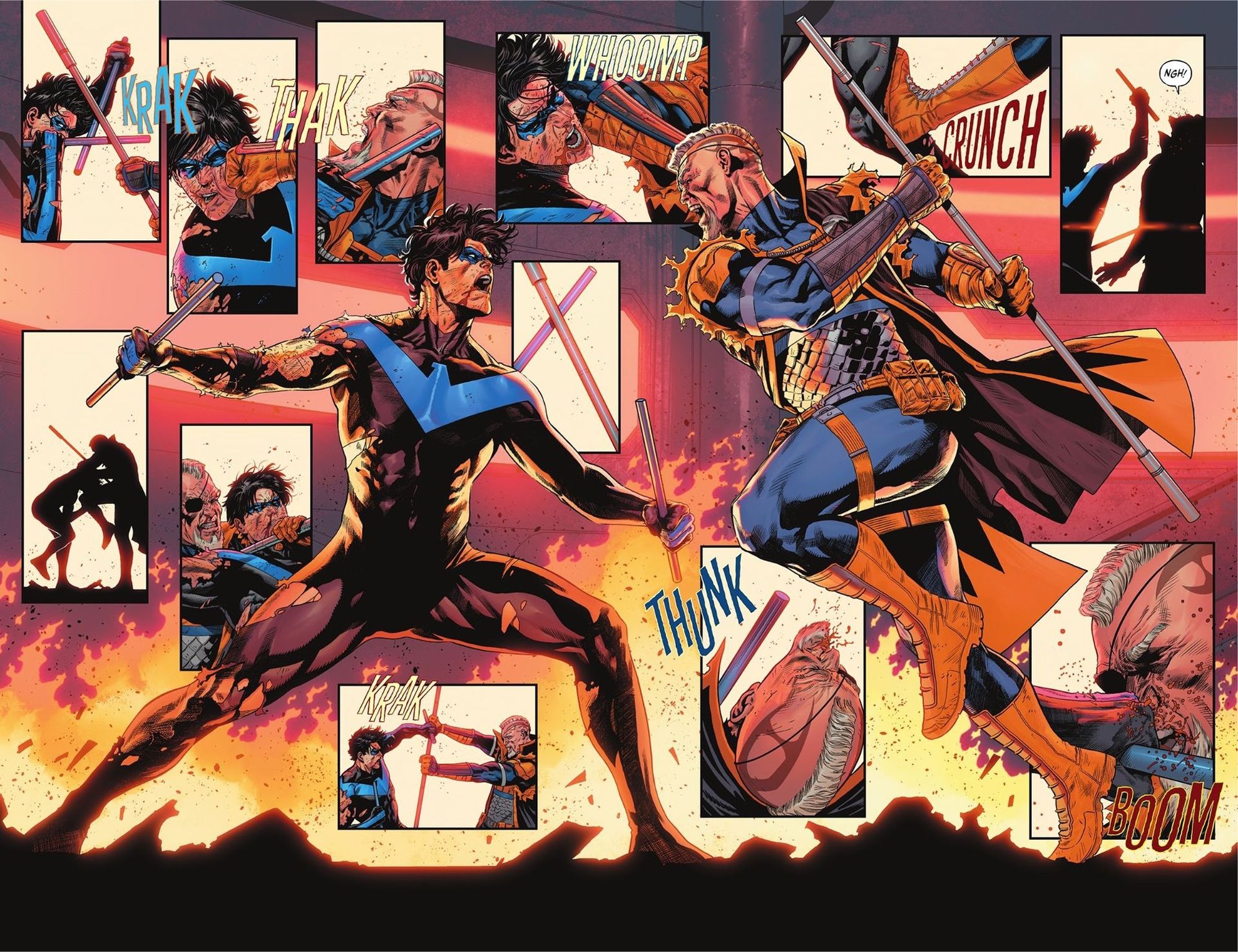
Something that I also was struck by is the role that Nightwing was playing in this event. But it really came into focus for me when actually Kyle [Rayner] was brought into the story. And he says, "I'm the sensitive artist type." It was a moment of self awareness, which I feel like a lot of characters in Dark Crisis have except for Dick [Grayson]. And so I was curious as to what sets apart Dick, emotionally perhaps, and the way that you're setting up the story around that.
Joshua Williamson: I think that Nightwing is trying, instead of being himself as a leader, he is trying to be Bruce as a leader in some ways. And Bruce can be cut off emotionally, sometimes, and be secretive, and not always tell you everything that's going on. We did a special before called The Road To Dark Crisis and in that story, it was Jon going to Nightwing. And in that story Nightwing admits that like he is acting like his father, like Jon is acting like his. Because originally when Clark had died, Bruce pretended like nothing was wrong. Right? And then when Batman died, Clark was very upset. And that's what they're both doing in this moment. They're both being their fathers. I don't think that Nightwing has necessarily got out of that yet. You know, like, I think he's still in that zone of like, "This is what my dad would do. This is what Batman would do." I think that Nightwing definitely doesn't believe, right, he doesn't believe that they're dead. And because he doesn't believe they're dead, he doesn't feel like they need to replace it. That's his reason for not stepping up. And part of what Alan Scott talks about, like, "Those things are just labels or team names. It's not about that. It's about you, and you need to kind of step up." There's a lot of stuff with Nightwing. And he has an emotional arc as well over the story.
I have this theory, right. Like, we talk about these characters all the time, right. And we talk about how they act, what they do, we also talk about, like, the actions and the stories, and we get kind of meta with it. And I always think at some point, the characters have to talk about it, too. I think the idea that, like all of them have died at some point or another. At some point, they're going to talk about that, and actually deal with it. And I think that was part of why I put it in there was that I wanted to have some characters sort of know. And that's why Nightwing, he's the one that doesn't believe, right? And I think on a meta level, it's very interesting when fans, like we all know they're gonna come back, you know, but then you get kind of, honestly, I don't want to say jaded, but you sort of don't want to give yourself up to the story.
That whole reveal that we know the Justice League is going to die was definitely something that came to mind. Why did you choose to be kind of upfront about that months in advance?
Joshua Williamson: Well, we want to sell books *laughs*. But the anniversary of The Death of Superman was coming. You know, that's what it was called, you know, it would have been impossible to keep it a secret. You know? So it's like, I think with that kind of stuff when you know it's impossible to keep a secret you should just go for it and put it on the cover. Yes. Put on the cover.
One last thing, I was wondering about how Dark Crisis On Infinite Earths is coming off of Dark Nights: Death Metal, which feels somewhat still recent. I was curious as to how you were going to build off of Death Metal, and how the events of that event shaped Dark Crisis on Infinite Earths.
Joshua Williamson: Toward the end of that event, like I'm very close friends with Scott Snyder and I was a consultant on that event, I worked on a lot of it with him. And in the lead-up to that a lot of those conversations we were having, there was just bits and pieces that I was like, "Oh, I want to use this, this is gonna go here." And so much of what Wonder Woman was doing in the untying of the knot of reality, all that kind of stuff was like, "This has to go somewhere. We have to use all of this stuff." And the idea that she was warned that like, "We're going to fix reality, but there will be a cost, there'll be a darkness." And it's like, well, we know what that is, you know, and so I think it's a lot of those conversations. It's interesting, a lot of the stuff I wanted to do in Dark Crisis actually came about from the conversation leading into Death Metal. Some of the stuff I wanted to do came out of the build-in versus the build-out, creatively.
Dark Crisis on Infinite Earths #3 will be released from DC Comics on August 2nd, 2022.
from ScreenRant - Feed https://ift.tt/TavcQER
